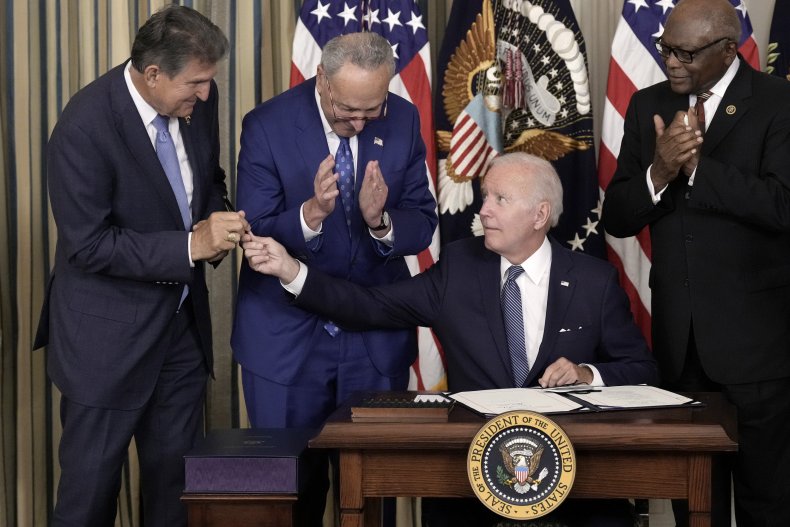The Inflation Reduction Act was signed into law on Tuesday by President Joe Biden.
It is one of the most important pieces of health care legislation since the Affordable Care Act, over 10 years ago.
Throughout the signing ceremony, Biden told Democratic Congress members and his administration officials that "with this law the American people won, and the special interest lost."
He also added that "people doubted whether any of that was going to happen, but we are in a season of substance."
What Is the Inflation Reduction Act?
The legislation will invest $750 billion in climate matters, health care and taxes.
Biden stated the bill would "allow us to boldly take the steps towards meeting all my climate goals, the ones we set out and the ones we ran".
The legislation was the final product of several months of negotiations between Senate Majority Leader Charles Schumer of New York and Democratic Senator Joe Manchin of West Virginia.
The bill will do a number of things:
- Big corporations will now pay a minimum of 15 percent tax
- It will let the government negotiate prices for specific drugs, ones that Medicare spends the most money on. This is set to lower the expense of prescription drugs
- For patients on Medicare, the cost of insulin will be limited at $35 a month
- For patients on Medicare there is a cap at $2000 for out-of-pocket spending
The package will make significant changes "to major parts of the U.S. economy, investing roughly $300 billion in climate and energy initiatives, limiting prescription drug prices and imposing a new minimum tax on large corporations. The legislation is also projected to reduce the federal deficit, in a move that Democrats pitched as a key element in slowing inflation."
How Will the Inflation Reduction Act Impact My Health Care?
While many of the changes won't be immediate, the investment in health care is set to lower the absurd cost of drug prices in the United States. A study by the KFF Kaiser Family Foundation indicated that almost one in two adults faces economic challenges in terms of affording their prescription drugs and health care costs.
This new law allows the U.S government to negotiate prescription drug prices on the most expensive drugs, as well as limiting the monthly cost of insulin.
Republicans blocked the cap cost of insulin for people with private medical health insurance, so those millions of people will not be receiving that benefit. In fact, Republicans unanimously voted against this package, whilst Democrats voted unanimously together.
Before signing the bill, the commander-in-chief said that this was a choice, "whether we protect the already powerful or have the courage to build a future where everybody has an even shot."









